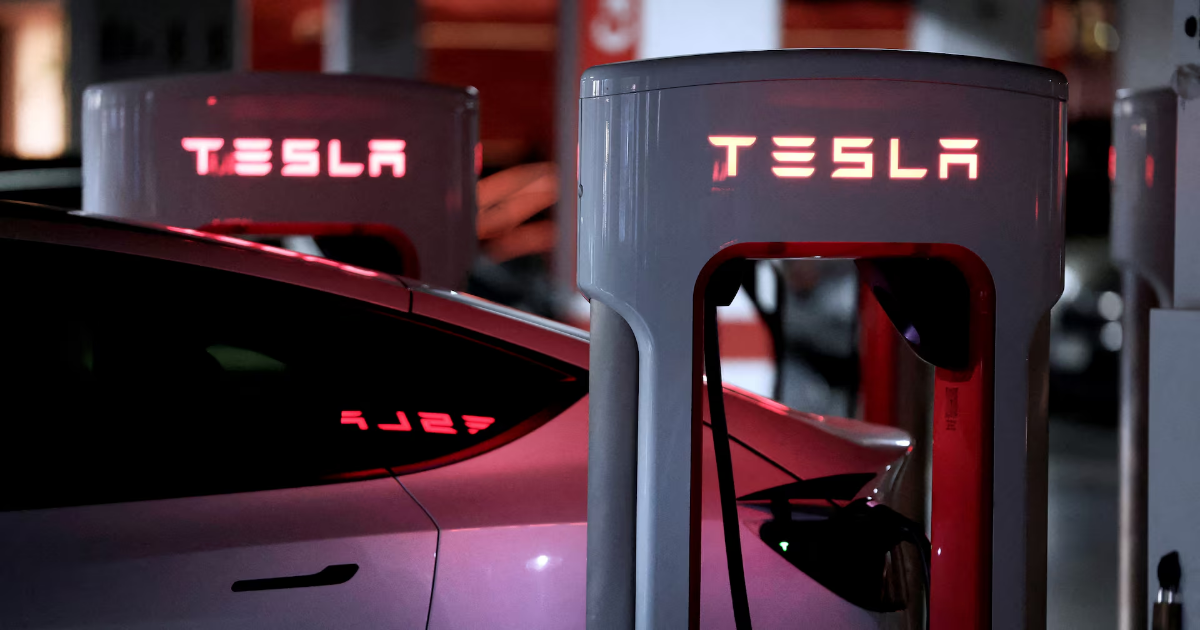April 1 (Reuters) – Tesla’s sales in key European markets fell again in March, data showed on Tuesday, adding to signs that drivers are shunning Elon Musk’s electric car brand as competition from China stiffens and some protest against his political views.
New Tesla (TSLA.O)
, opens new tab sales in France and Sweden dropped for a third consecutive month, contributing to its lowest first-quarter sales figures in the two countries since 2021.
Sign up here.
“Never has a car brand suffered such a global fall from grace,” said Quentin Willson, founder of British EV campaign group FairCharge and a Tesla owner.
Billionaire CEO Musk, a close ally of U.S. President Donald Trump, has stirred controversy by courting far-right parties in Europe, adding to Tesla’s sales slump ahead of the much-anticipated launch of its Model Y mid-size SUV.
In response to his right-wing activism, Tesla cars and dealerships have become targets for vandalism. Dozens of cars were burnt and showrooms spray painted in several European cities including Rome, Berlin and Stockholm in recent days.
“We’re all embarrassed,” said Luca Del Bo, president and co-founder of Italy’s Tesla owners club, who bought his first Tesla 10 years ago and currently owns a 2022 Model 3.
While describing Musk as a genius, he said: “We’d all be happy of course if Musk just went back to just being a CEO.”
Analysts expect data from Italy and other European markets on Tuesday and Wednesday to provide more clues on the group’s global first-quarter delivery figures, to be released on Wednesday, and consumer sentiment towards the brand.
Tesla last month registered 3,157 car sales in France, 911 in Sweden and 2,211 in Norway, dropping 36.83%, 63.9% and 1% respectively from last year, official data showed.
The multiple bar charts show changes in Tesla’s battery electric vehicle sales in some European markets in March and the first quarter.
In Denmark, registrations totalled 593, down 65.6%, and they fell by 61% to 1,536 in the Netherlands.
Quarterly sales were down 41.1% in France, 55.3% in Sweden, 12.5% in Norway, 55.3% in Denmark and 49.7% in the Netherlands.
The group’s market share in France dropped to 1.63% in the quarter ending March, from 2.55% a year ago. It lost ground to brands grouped as “others” by national car body PFA. These include BYD (002594.SZ)
, opens new tab and other Chinese EV makers, which increased their share to 3.19%.
Spain and Portugal bucked the trend, with Tesla registrations for March up 34.3% and 2.1% respectively. But they dropped 11.8% and 25.7% in the quarter despite an accelerating electrification trend in the two markets that led to market share gains for some Chinese competitors.
Similarly, the brand’s registrations in Italy were up 51.3% in March but down 6.8% for the quarter.
Item 1 of 3 A Tesla electric vehicle is charged at a Tesla Supercharger battery charging station in Barakaldo, Spain, March 29, 2025. REUTERS/Vincent West/File Photo
[1/3]A Tesla electric vehicle is charged at a Tesla Supercharger battery charging station in Barakaldo, Spain, March 29, 2025. REUTERS/Vincent West/File Photo Purchase Licensing Rights
Tesla shares, which have plunged this year, were up 6.8% in New York trade on Tuesday.
A pie chart showing Tesla sales in some of its biggest markets in Europe.
TESLA TROUBLES
Tesla faces a number of challenges in Europe. It has a small, ageing lineup while traditional automaker rivals and new Chinese entrants are launching new and often cheaper EVs.
“Tesla’s weak numbers in Europe are the result of a combination of factors,” said Ben Nelmes, chief executive of research group New AutoMotive.
“The company has failed to develop models that can compete on price. On top of this, the CEO’s involvement in U.S. politics is alienating many consumers.”
Musk’s support of far-right parties in Europe, including for Germany’s AfD, which came second in February’s national elections, also appears to have hurt Tesla’s sales on the continent.
The chart shows Tesla’s year-to-date share move compared to some Chinese automakers.
“In the United States, the strategy would be to leverage, would be to tie to patriotism and shift to the right,” said Eric Schiffer, chief executive of private equity firm the Patriarch Organization in Los Angeles.
“The European strategy is going to be more challenged and will need to be more about the value and competitive differences with the market there.”
In response to Musk’s right-wing activism, people have gathered outside car dealerships in Washington and Berlin to protest. “Tesla Takedown” protests are planned across Europe and the U.S.
On Monday the tech billionaire said an overnight fire at a Tesla dealership in Rome that destroyed 17 cars was an act of terrorism, reiterating comments by Trump.
On the same day, environmental campaigners spray-painted some Tesla stores during an unrelated protest in several European countries including Sweden and Germany in what activists described as “peacefully disruptive” strategy.
“This has to do with the company, Elon Musk and the politics he’s standing for,” said Helen Wahlgren, a spokesperson from Restore Wetlands, part of the A22 Network across Europe.
“It has to do with autocracy and totalitarianism,” she said.
Reporting by Alessandro Parodi, Jean Terzian, Louise Rasmussen, Inti Laundauro, Bart Meijer, Giulio Piovaccari, Marie Mannes, Javi West Larrañaga and Andrea Mandalà; writing by Alessandro Parodi and Nick Carey. Editing by David Evans, Mark Potter and David Goodman
Our Standards: The Thomson Reuters Trust Principles.
Alessandro is an Italian journalist based in Gdansk reporting on European markets, with focus on Italian companies. Previously, he worked as a multimedia freelancer in South Africa covering general news and cultures.
